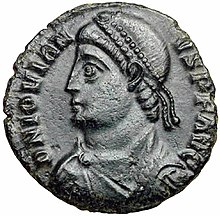Jovian (emperor)
| Jovian | |||||
|---|---|---|---|---|---|
| 64th Emperor of the Roman Empire | |||||

Solidus of emperor Jovian
|
|||||
| Reign | 27 June 363 – 17 February 364 | ||||
| Predecessor | Julian the Apostate | ||||
| Successor | Valentinian I | ||||
| Born | 331 Singidunum (modern Belgrade, Serbia) |
||||
| Died | 17 February 364 (aged 33) Dadastana (in Anatolia) |
||||
| Burial | Church of the Holy Apostles, Constantinople | ||||
| Wife |
|
||||
| Issue | Two sons, one named Varronianus (consul in 364), c. 380 | ||||
|
|||||
| Father | Varronianus | ||||
| Religion | Orthodox Catholic Christianity | ||||
| Full name | |
|---|---|
| Flavius Jovianus (from birth to accession); Flavius Jovianus Augustus (as emperor) |
Jovian (Latin: Flavius Iovianus Augustus; 331 – 17 February 364) was Roman Emperor from 363 to 364. Upon the death of emperor Julian the Apostate during his campaign against the Sassanid Empire, Jovian was hastily declared emperor by his soldiers. He sought peace with the Persians on humiliating terms and reestablished Christianity as the state church. His reign lasted only eight months.
Jovian was born at Singidunum (today Belgrade in Serbia) in 331 AD, the son of Varronianus, the commander of Constantius II's imperial bodyguards (comes domesticorum). He also joined the guards and by 363 had risen to the same command that his father had once held. In this capacity, Jovian accompanied the Roman Emperor Julian on the Mesopotamian campaign of the same year against Shapur II, the Sassanid king. After the Battle of Samarra, a small but decisive engagement, the Roman army was forced to retreat from the numerically superior Persian force. Julian, mortally wounded during the retreat, died on 26 June 363. The next day, after the aged Saturninius Secundus Salutius, praetorian prefect of the Orient, had declined the purple, the choice of the army fell upon Jovian. His election caused considerable surprise: Ammianus Marcellinus suggests that he was wrongly identified with another Jovianus, chief notary (primicerius notariorum), whose name also had been put forward, or that during the acclamations the soldiers mistook the name Jovianus for Julianus, and imagined that the latter had recovered from his illness.
...
Wikipedia
